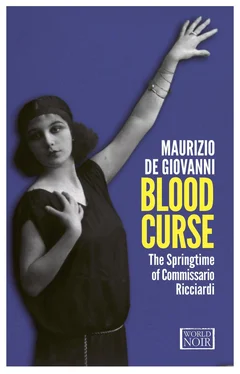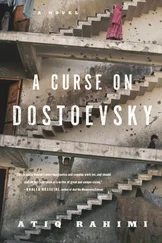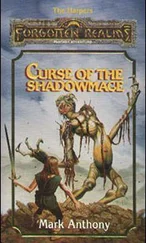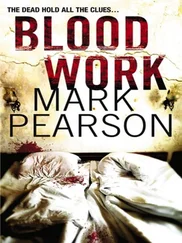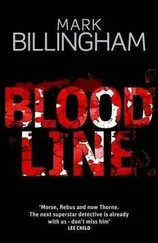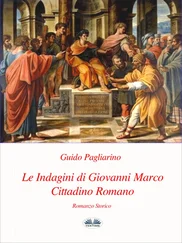Maurizio de Giovanni - Blood Curse
Здесь есть возможность читать онлайн «Maurizio de Giovanni - Blood Curse» весь текст электронной книги совершенно бесплатно (целиком полную версию без сокращений). В некоторых случаях можно слушать аудио, скачать через торрент в формате fb2 и присутствует краткое содержание. Жанр: Исторический детектив, Исторический детектив, на английском языке. Описание произведения, (предисловие) а так же отзывы посетителей доступны на портале библиотеки ЛибКат.
- Название:Blood Curse
- Автор:
- Жанр:
- Год:неизвестен
- ISBN:нет данных
- Рейтинг книги:3 / 5. Голосов: 1
-
Избранное:Добавить в избранное
- Отзывы:
-
Ваша оценка:
- 60
- 1
- 2
- 3
- 4
- 5
Blood Curse: краткое содержание, описание и аннотация
Предлагаем к чтению аннотацию, описание, краткое содержание или предисловие (зависит от того, что написал сам автор книги «Blood Curse»). Если вы не нашли необходимую информацию о книге — напишите в комментариях, мы постараемся отыскать её.
Blood Curse — читать онлайн бесплатно полную книгу (весь текст) целиком
Ниже представлен текст книги, разбитый по страницам. Система сохранения места последней прочитанной страницы, позволяет с удобством читать онлайн бесплатно книгу «Blood Curse», без необходимости каждый раз заново искать на чём Вы остановились. Поставьте закладку, и сможете в любой момент перейти на страницу, на которой закончили чтение.
Интервал:
Закладка:
Tonino Iodice had returned home from work to his wife, mother, and three children. It had been a terrible day. As he did every evening, he stopped in the atrium of the old apartment building in Via Montecalvario to don his mask, that of the weary but satisfied father and provider, a man whose business was thriving. He knew it was wrong, but it was for their own good. The last thing he wanted to do was to make them share his burden.
It fell to him to lie awake most of the night, staring at the ceiling and listening to the breathing of his sleeping family. Another day without disaster; who knows how much longer we’ll be able to hold out. It fell to him to reckon and re-reckon his accounts, always the same sums of money, always the same days of the calendar, waiting with dread for his promissory note to come due, searching for the words he hoped to use to persuade the old woman to give him one last chance.
Tonino used to have a pizza pushcart and, now that he thought back on it, things hadn’t been so bad. His mistake was that he hadn’t appreciated it, that he’d wanted something better. He woke up every morning at five, made the dough, topped off the oil, set up the pushcart, dressed as warmly as he could if it was cold out, or else prepared to be assailed by the blast of brutal summer sunlight, and headed out into the city. Always the same streets, the same faces, the same customers.
Everyone loved Tonino; he belted out songs at the top of his voice, and it was a fine voice he had. That’s what his mother told him and his customers said so, too. He kidded all the lovely ladies, pretending he’d fallen for them head over heels, and they’d laugh and say, All right, all right, Toni’, just give me some pizza and get outta here. He was the kind of guy who spread good cheer, with his little pushcart, his whistle, and his fine voice, and the policemen would look the other way, never asking him for his vendor’s license or food permit; in fact, now and then they’d come by and he’d offer them a pizza, pe’ senza niente , on the house. The months turned into years, and he’d married his pretty Concettina, who was even more cheerful and penniless than he was. Then came Mario, Giuseppe, and Lucietta, the three children in quick succession, as good-looking as their mother, as boisterous and loud as their father, but as ravenously hungry as the two of them put together. Soon the pushcart wasn’t bringing in enough to make ends meet.
That was when Tonino made up his mind that, unless he made an effort, unless he reached out for something better, they’d all soon be on the road to hunger. And, even though no one dared to say it outright, everyone was feeling poorer these days. More and more, people were filling their bellies with whatever they could scrape together at home. His customers were dwindling, and with the eight-day pizza plan-eat today and pay next week-many ate on credit, and then dropped out of sight.
That’s when it occurred to him that rich people could still afford to go out to eat, and that rich people wanted to sit down to enjoy their meal, to listen to the parking attendant serenade them on his mandolin, to eat, drink, and make merry. The old blacksmith and farrier in Vicolo San Tommaso was about to retire, and he was giving up his place. Two long tables and one small one would fit in the space-maybe he could even fit in a second small table. To start out, he’d make the pizzas and Concetta could wait tables; then, when business picked up, Mario, the eldest, could pitch in.
Having gathered together his mother’s savings and borrowed every last lira he could from his other family members and friends, he was still short by a considerable sum. He’d sold his pizza cart, so there was certainly no turning back. And so a friend of his told him there was an old woman in the Sanità quarter who was willing to lend money long term, at a low rate of interest.
He went to see her and he talked her into it. He was good at talking people into things, and better still at persuading old women. He’d gotten the money he needed, and now six months had gone by since his pizzeria had opened for business.
Everyone he knew came to the grand opening-relatives, friends, and passing acquaintances. Not the old woman, though; she had told him she never liked to leave the house. Everyone came and everyone ate their fill, that day and the next. It would bring good luck, and he hadn’t charged them a cent. The only problem was that after that the friends and relatives stopped coming around.
Tonino understood that envy wounds more than scoppettate , musketballs. That was what the old people said, and the old people knew what they were talking about. Sure, every now and then someone would pass by and stop in, but the pizzeria wasn’t on a main thoroughfare. You had to know about it to get there-and no one seemed to know about it. As the days passed, and as the months hurried along after them, it dawned on Tonino that he’d been a fool: he’d spent too much money setting up and getting ready to open, money that he’d never see again. After three months, the old woman had extended the loan for two more, this time at a higher rate of interest. Then she’d given him one last extension, just one month this time, shouting him out of her apartment. She warned him that this was the final deadline. He would have to pay her what he owed.
Tonino swung open his own front door and Lucietta leapt into his arms, covering him with kisses; she was always the first to hear him come home. He hugged her tight and, with a smile stamped on his face, he strode in to face the rest of his family. He felt his heart tighten in his chest. The promissory note was coming due tomorrow, and for the last time. And he didn’t even have half the money he owed.
II
Springtime came to Naples on the fourteenth of April of the year nineteen thirty-one, just a few minutes after two in the morning.
It showed up late and it came the way it always does, with a gust of fresh wind from the south, following a cloudburst. The dogs were the first to detect it, in the courtyards of the Vomero farmhouses and in the alleys down by the waterfront; they lifted their muzzles and sniffed at the air and then, heaving a sigh, went back to sleep.
Its arrival went unremarked upon as the city got its last couple of hours’ rest between the dead of night and early morning. There were no celebrations, no regrets. Springtime didn’t demand a festive welcome, and required no applause. It occupied the streets and the piazzas. And it stood patiently outside the doors and shuttered windows, waiting.
Rituccia wasn’t asleep; she was only pretending. Sometimes it worked. Sometimes he’d just stand there, looking at her, and then turn and go back up to the sleeping loft. Then she’d hear the creaking of the old bed, his body tossing and turning, followed by his sawing snore, a horrible sound that greeted her ears like a thing of beauty because it spared her such horror. Sometimes. Sometimes she was allowed to sleep.
But that night, the springtime had come knocking at the window, stirring his blood, blood curdled by the cheap wine from the tavern at the end of the vicolo , the dark, narrow Neapolitan lane. Pretending to sleep wasn’t going to do her any good. As always, when she felt her father’s hands on her body, she thought of her mother. And she cursed her for being dead.
Carmela whimpered in her sleep; arthritis was a red-hot iron jolting and crushing her bones. She wasn’t cold, the heavy blanket covered her snugly, and the walls were dry. If she’d been awake, rather than deep in a dreamless slumber, the old woman would have looked around proudly at the flowered wallpaper she’d recently had installed. If she’d been awake, she’d have mused that with all those flowers on her walls, she had bought herself a springtime of her own, and with the new season on its way, the flowers would be competing, out on her balcony and there in her apartment.
Читать дальшеИнтервал:
Закладка:
Похожие книги на «Blood Curse»
Представляем Вашему вниманию похожие книги на «Blood Curse» списком для выбора. Мы отобрали схожую по названию и смыслу литературу в надежде предоставить читателям больше вариантов отыскать новые, интересные, ещё непрочитанные произведения.
Обсуждение, отзывы о книге «Blood Curse» и просто собственные мнения читателей. Оставьте ваши комментарии, напишите, что Вы думаете о произведении, его смысле или главных героях. Укажите что конкретно понравилось, а что нет, и почему Вы так считаете.
